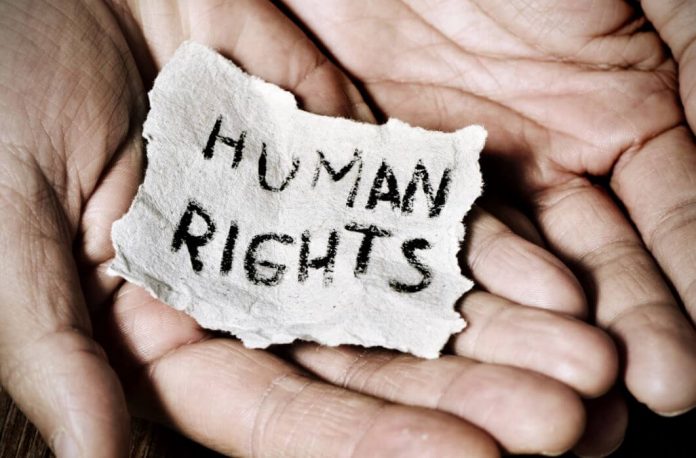This article is written by Amrit Kaur, a student of Dr. B.R. Ambedkar National Law University, RAI, Sonepat. The article assesses the relationship between human rights and counter-terrorism efforts.
Table of Contents
Meaning of human rights
Human rights are universal ideals and legal safeguards that protect people and groups against state-sponsored actions and omissions that infringe on their fundamental freedoms, entitlements, and human dignity. Civil, cultural, financial, political, and social rights, as well as the right to development, are all part of the entire spectrum of human rights that must be respected and promoted. Moreover, human rights are universal, that is, they belong to the whole of humanity inherently and they are interconnected and indivisible.
Laws on International Human Rights
Several key international human rights treaties, as well as customary international laws, represent international human rights law. The International Covenant on Economic, Social, and Cultural Rights, as well as the International Covenant on Civil and Political Rights and its two Optional Protocols, which are, one of 1966 and the other of 1989, are among these accords. The International Convention on the Elimination of All Forms of Racial Discrimination is another important global human rights agreement between the state parties at the international level.
To ensure the protection of human rights and fundamental freedoms of humanity, there is a growing corpus of subject-specific treaties and protocols, as well as several regional treaties. International human rights law encompasses not only the declaration of rights in treaties but also rights and freedoms that have formed part of customary international law, which binds all states even if they are not signatories to a specific treaty.
Human rights law basically requires and prohibits states to perform specific acts. Therefore, recognizing human rights is an obligation that states must uphold, defend, and fulfill. Non-interference with the enjoyment of the human rights of the citizens is a key component of respecting human rights. To comply with their international legal obligations in the fight towards terrorism, states might take suitable legislative, judicial, administrative, or educational measures within their jurisdictions.
Meaning of terrorism
Terrorism is usually defined as acts of violence directed at civilians in the pursuit of political or ideological goals. Although the international community is yet to establish a comprehensive definition of terrorism, current declarations, resolutions, and universal “sectoral” treaties address certain parts of it and specify certain acts and key characteristics of terrorism.
To put forward one of the definitions, terrorism is, a criminal act aimed at or a calculated act, to provoke a state of terror in the minds of the general public, a group of individuals, or particular persons for political purposes. It is unjustifiable in any condition, regardless of the considerations of a political, philosophical, ideological, racial, ethnic, religious, or other nature that may be invoked. This definition of terrorism was given in 1994 in the General Assembly’s Declaration on Measures to eliminate international terrorism, set out in resolution 49/60.
The measures which help in combating terrorism are known as counter-terrorism measures.
Human rights and counter-terrorism
Terrorism has a direct impact on people’s ability to enjoy their human rights. Therefore, states have a responsibility to implement effective counter-terrorism measures. Despite the complexity and the scale of the problems that states and others face in their efforts to combat terrorism, international human rights law is flexible enough to handle them effectively.
Human rights promotion and protection while countering terrorism
Just as terrorism exerts an influence on human rights and society, so does counter-terrorism. States have the right and the obligation to implement effective counter-terrorism measures since terrorism has a significant effect on several fundamental human rights. Effective counter-terrorism measures and human rights protection are complementary and mutually reinforcing objectives that must be pursued in tandem as part of a state’s responsibility to safeguard citizens within its jurisdiction.
Through the adoption of the United Nations Global Counter-Terrorism Strategy by the General Assembly in resolution 60/288, the international community has committed to adopting measures that ensure universal respect for human rights and the rule of law as the fundamental foundation of the fight against terrorism.
The UN Global Counter-Terrorism Strategy emphasizes the inextricable connections between human rights and security and places the rule of law and respect for human rights at the heart of national and international counter-terrorism operations. Member states have committed to ensuring respect for human rights and the rule of law as the fundamental foundation of their fight against terrorism as part of the Strategy.
To be effective, this should include developing national counter-terrorism strategies that seek to prevent acts of terrorism and address the conditions that facilitate their spread, prosecuting or lawfully extraditing those responsible for such criminal acts, encouraging active participation and leadership from civil society, and paying attention to the rights of all victims of human rights violations. Not only is it critical to promote and safeguard human rights in the fight against terrorism, but states must also ensure that any counter-terrorism measures they use, must conform with their international human rights obligations.
In addition to states’ general obligation to act in accordance with human rights at all times, the universal treaties on counter-terrorism specifically demand compliance with various areas of human rights law.
The flexibility of human rights law
States have a duty to promote and safeguard human rights when combating terrorism as it is an important element of the battle against terrorism. National counter-terrorism programs should prioritize preventing terrorist attacks, prosecuting those who commit such crimes, and promoting and protecting human rights and the rule of law. To begin with, it is vital to note that the great majority of counter-terrorism measures are based on existing legislation. Some limits on the enjoyment of certain human rights may be allowed under a small number of exceptional national circumstances.
Nonetheless, states face significant practical problems in ensuring both the promotion and protection of human rights as well as while adopting effective counter-terrorism measures. One such example is the problem that states face while safeguarding intelligence sources, which may necessitate restricting the revelation of evidence during terrorism-related court hearings yet preserving the individual’s right to a fair trial and a fair hearing.
However, these are not insurmountable obstacles. States can use the flexibilities provided under the international human rights law framework to successfully achieve their obligations under international law. Human rights legislation provides for limitations on some rights as well as derogations from certain human rights standards in a small number of extraordinary circumstances. These two types of restrictions are designed to provide states with the freedom they need to cope with during extraordinary circumstances, while also complying with their duties under international human rights law (if several conditions are met).
Limitations
Certain rights, such as the right to freedom of expression, the right to freedom of association and assembly, the right to free movement, and the right to respect for one’s private and family life can be lawfully limited by states, as stipulated for by different international human rights treaties. However, in addition to conforming to the principles of equality and non-discrimination, the limitations must be imposed by law to achieve one or more specific legitimate goals, and these must be “essential in a democratic society.”
Prescription by law
The need that any measure restricting the enjoyment of rights and freedoms be laid forth within, or approved by, a prescription of law is recognized by international, regional, and domestic human rights instruments and guidelines. To be “prescribed by law” means:
- The law must be adequately accessible so that persons have a sufficient indication of how the law will limit their rights, and
- The law must be formed precisely enough so that individuals can govern their conduct.
In pursuance of a legitimate purpose
The permissible legitimate grounds for interference differ based on the rights subject to potential limits as well as the human rights treaty in consideration. They include national security, public safety, public order, health, morals, and the human rights and liberties of others.
The essential goal of counter-terrorism is frequently exploited as a pretext to expand state authority in other areas. No matter how terrible, offences that are not acts of terrorism should not be subjected to counter-terrorism laws. Further counter-terrorism measures shall not be applied to conduct that does not meet the definition of terrorism, even if it is carried out by someone who is suspected of committing terrorist offences. Again, this necessity is reflected in several international and regional protocols on the promotion and protection of human rights in the context of counter-terrorism.
Necessity and proportionality
In essence, this implies the restrictions must pass the necessity test as well as the proportionality requirement. As a result, any restriction on the free enjoyment of rights and freedoms must be required to achieve a pressing objective, with the impact on rights and freedoms precisely proportionate to the nature of that objective.
To be essential, there must be a rational link between the restricting measure and the pursuit of the specific goal. If the measure logically furthers the goal, the presence of a reasonable link will usually be acknowledged, but further evidence of this connection may be needed if it is not readily apparent.
Derogations
States may adopt actions to derogate from some human rights obligations under the International Covenant on Civil and Political Rights under a restricted set of circumstances, such as a public emergency threatening the nation’s survival. Article 4 of the International Covenant on Civil and Political Rights lays forth the formal and substantive conditions that a state party must meet to lawfully derogate from certain covenant commitments.
Non-derogable human rights
Derogation from certain human rights contained in international human rights treaties is prohibited even in times of emergency. Article 4(2) of the International Covenant on Civil and Political Rights states that the right to life, freedom from torture or cruelty, inhuman or degrading treatment or punishment, prohibition of slavery and servitude, freedom from imprisonment for breach of contract, freedom from retrospective penalties, and the right to be recognized as a person before the law are all non-derogable rights.
“Public emergency” which threatens the life of the nation
Only a “public emergency that threatens the nation’s life” invokes the Covenant’s right to derogate under Article 4(1). Such an emergency has been classified as exceptional by the Human Rights Committee. Not every commotion or disaster qualifies as the same. Even during an armed conflict, the Committee has said that derogations from the Covenant are permissible only if and to the extent that the situation constitutes a threat to the existence of the nation. Whether or not terrorist activities or threats constitute a state of emergency must be determined on a case-to-case basis.
Permissible extend of derogations
Any derogation from the Covenant’s Article 4(1) may only be made “to the extent strictly required by the exigencies of the situation.” The transitory character of any derogation is crucial to this requirement. The Human Rights Committee has said that a state party derogating from the Covenant’s main goal must be for the restoration of normalcy so that full respect for the Covenant can be restored. Any deviation from the Covenant must be justified and proportionate.
Conclusion
Human rights are affected greatly by both terrorism and counter-terrorism measures. However, to efficiently combat terrorism, the international community must soon come up with an encompassing definition of terrorism to clarify the scope of the same. Human rights and freedoms must be promoted and fostered by the states while adopting counter-terrorism efforts. Moreover, as stated above, the international human rights law is flexible enough to help the states in the same. Certain specific human rights can be limited or derogated too but this requires some conditions to be met in the first place. Therefore, the states must be vigilant while adopting various counter-terrorism efforts.
References
- https://www.ohchr.org/documents/publications/factsheet32en.pdf
- https://www.unodc.org/unodc/en/terrorism/news-and-events/human-rights-while-countering-terrorism.html
Students of Lawsikho courses regularly produce writing assignments and work on practical exercises as a part of their coursework and develop themselves in real-life practical skills.
LawSikho has created a telegram group for exchanging legal knowledge, referrals, and various opportunities. You can click on this link and join:
 Serato DJ Crack 2025Serato DJ PRO Crack
Serato DJ Crack 2025Serato DJ PRO Crack









 Allow notifications
Allow notifications


